Are You Disinfecting These Areas In Your House Daily Amid Covid-19?
By Dr. Nikita Toshi +2 more

Get,

to manage your symptom
Get your,


4 Cr+ families
benefitted

OTP sent to 9988776655



You’ve successfully subscribed to receive
doctor-approved tips on
Whatsapp

Get ready to feel your best.

Hi There,
Download the PharmEasy App now!!


Register to Avail the Offer
Send OTPBy continuing, you agree with our Privacy Policy and Terms and Conditions

Hi There,
Sign up on PharmEasy now!!
Trusted by 4 crore+ families

OTP sent to 9988776655



You have unlocked 25% off on medicines




Code: NU25



By Dr. Nikita Toshi +2 more
The number of COVID-19 cases in India has already crossed the 1.8 lakh mark and continues to steadily rise each day. Staying indoors can help us prevent COVID-19 from spreading. It is also essential for us to maintain personal hygiene as well as hygiene at home to minimize our chances of getting sick.
Transmission of novel coronavirus occurs much more commonly through respiratory droplets than through objects. Current evidence suggests that COVID-19 may remain active for hours to days on different types of surfaces. Therefore, cleaning visibly dirty areas followed by disinfection is the best measure for the prevention of COVID-19 in day to day practice.
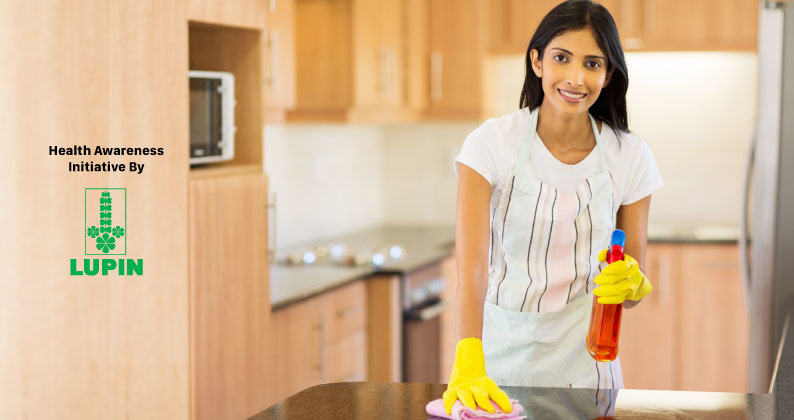
Table of Contents
Cleaning is the process of removal of germs, dirt, and impurities from a variety of surfaces. It does not kill all germs, but removing them, lowers their numbers and the risk of spreading infection. Disinfection is the process of using chemicals (disinfectants) to kill germs present on different surfaces. If done correctly, it can kill harmful microorganisms. Dettol, Lizol, bleach, rubbing alcohol, sodium hypochlorite, etc. are the various types of disinfectants that are easily available.
According to CDC Disinfection to reduce transmission of COVID-19 at home is likely not needed unless someone in your home is sick or if someone who is positive for COVID-19 has been in your home within the last 24 hours. Clean high-touch surfaces such as doorknobs, tables, and light switches regularly.
Dr. M.G. Kartheeka, MBBS, MD
This is probably the most touched surface in the house. Right from the front door of your house to the handles on cupboard doors and rooms, it is vital to make it a habit to disinfect and wipe all the door handles in the house. Don’t forget to clean and disinfect the refrigerator door handle, table surfaces, metal/plastic/rubber baby toys, chairs and desk surfaces as well.
Think of your mobile phone as your third hand. We tend to check our phones at least 20-30 times a day, helping germs easily transfer from your hands to your mobile phone. Phones should preferably be cleaned with disinfecting wipes gently on exterior parts of phones in switched off mode. Avoid the use of bleach or the entry of moisture through any openings. Many mobile companies have provided recommendations on the cleaning of phones during this COVID-19 pandemic. Check your phone manufacturer website for instructions on what to use to clean your phone to avoid damage to the device.
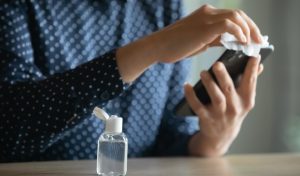
Surfaces must be cleaned with water and soap or a detergent first to remove dirt, followed by disinfection, if you do sanitize or disinfect, clean surfaces first because impurities like dirt may make it harder for sanitizing or disinfecting chemicals.
Dr. Ashish Bajaj – M.B.B.S, M.D.
While you might not be touching your face regularly, you still touch your spectacles very often. Wipe your spectacle frames with a disinfecting wipe or a cloth dampened with disinfectant liquid*. You can also use a sanitiser and a clean, lint-free towel to wipe the lenses.
Cleaning our laptops is more important than ever now that we are working from home. Use a disinfectant wipe or a soft, lint-free cloth and wipe on the top and sides of each key, preferably in a switched off mode. Also, clean the surface and bottom of the keyboard thoroughly. Entry of moisture or any disinfectant liquid through any openings must be avoided.
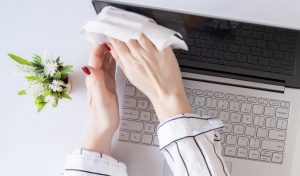
We all find ourselves watching quite a bit of TV during this lockdown. This means that your remotes need a good cleaning since it is being handled by everyone at home. Remember to clean and disinfect your remote gently with a disinfectant wipe or a cloth soaked in disinfectant liquid. Needless to say, the entry of moisture and disinfectant liquid inside the remote control must be avoided during cleaning.
Every packed grocery item should be wiped with soapy water or sanitiser (food packets, food bags, etc.) While purchasing groceries, make sure that you use cloth bags. Wash and disinfect them after every purchase.
Clean your fruits and vegetables under running water. You may soak them in a solution of salt or baking soda with water for some time. Rinse the items with clean water, dry and store them normally.
If you are visiting the grocery or vegetable store, it means that you are taking your purse/wallet out. Add your wallet to the list of things you need to sanitize after visiting a store. Use a small amount of hand sanitiser* applied to the surface of the purse with a tissue or a clean cloth. You can disinfect keys (without remote controls) and coins by soaking them in a soap solution of dishwashing liquid for a short amount of time. After this, rinse them with clean water and leave them in the sun to dry. As far as possible, try and use digital or card payments instead of cash. After handling/touching a card or cash for transaction/payment, always clean your hands with an alcohol-based hand sanitiser.
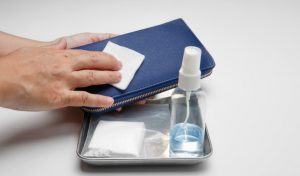
Nowadays, you are probably using your kitchen counter numerous times a day. Areas where food is stored or prepared have more microbial contamination than other places in the home.
Have you stopped to think about the number of times you switch on and off the lights and fans at home? Switches and doorbells can be cleaned with disinfectant wipes once every couple of days.
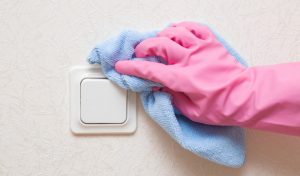
*Disinfectant wipes should have at least 60% ethanol or 70% isopropanol content while sanitisers should have at least 60% ethanol content.
It has become more important than ever to make sure that our houses stay virus-free and clean. Make sure you wash your hands regularly to minimize the spread of germs inside your house. Stay safe!
Disclaimer: The information provided here is for educational/awareness purposes only and is not intended to be a substitute for medical treatment by a healthcare professional and should not be relied upon to diagnose or treat any medical condition. The reader should consult a registered medical practitioner to determine the appropriateness of the information before consuming any medication. PharmEasy does not provide any guarantee or warranty (express or implied) regarding the accuracy, adequacy, completeness, legality, reliability, or usefulness of the information; and disclaims any liability arising thereof.
Links and product recommendations in the information provided here are advertisements of third-party products available on the website. PharmEasy does not make any representation of the accuracy or suitability of such products/services. Advertisements do not influence the editorial decisions or content. The information in this blog is subject to change without notice. The authors and administrators reserve the right to modify, add, or remove content without notification. It is your responsibility to review this disclaimer regularly for any changes.

Leave your comment...

View all comments(1)
“Thank you for sharing such great information.
It has help me in finding out more detail about disinfectant for COVID-19